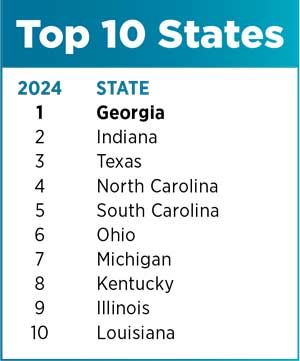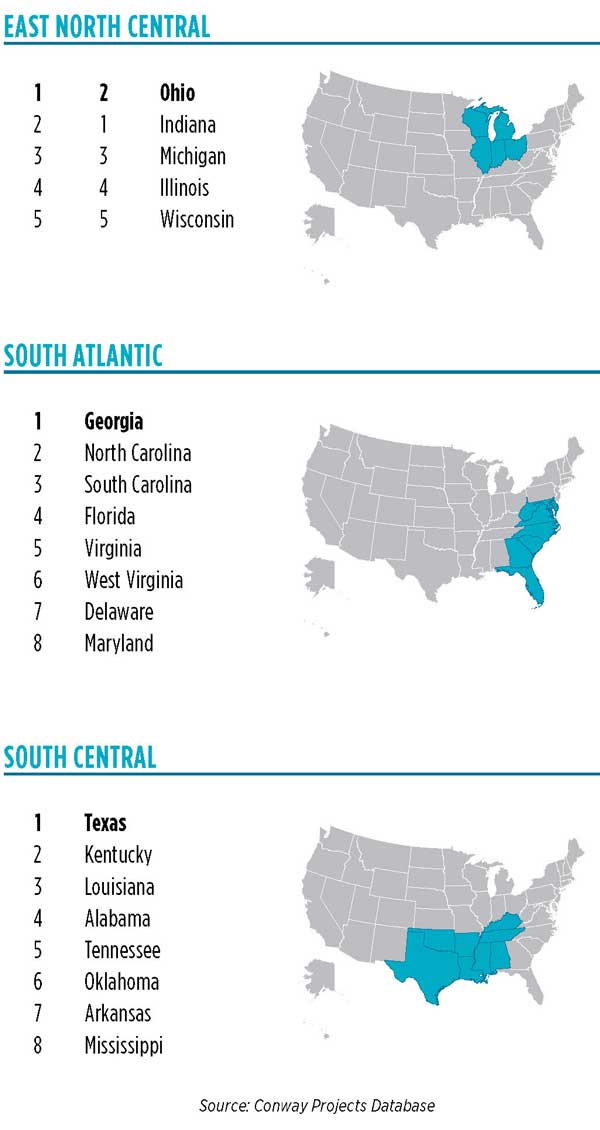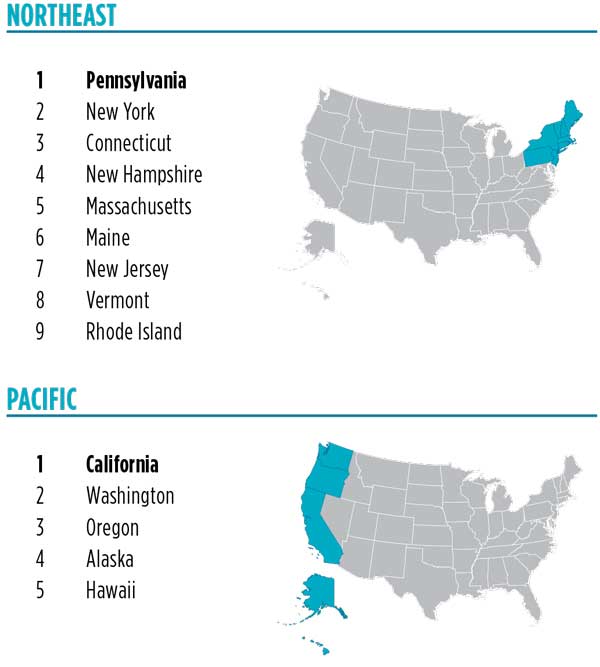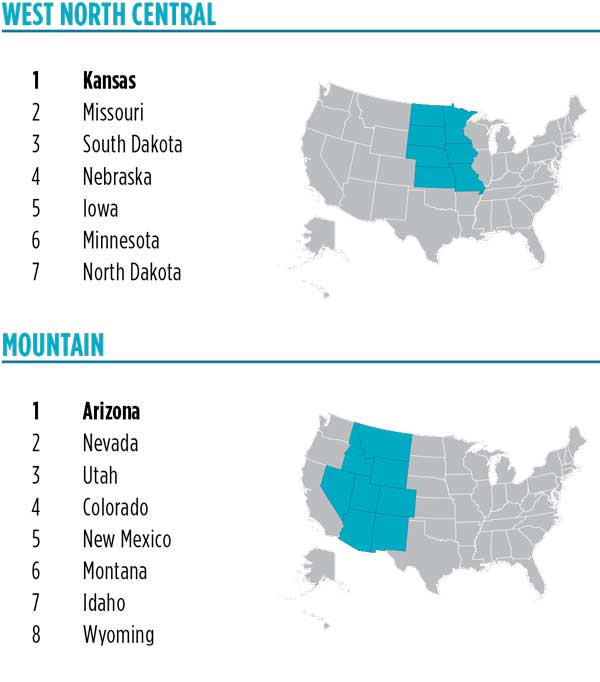 Always a strong performer in Site Selection’s annual Prosperity Cup contest, Georgia has unseated North
Always a strong performer in Site Selection’s annual Prosperity Cup contest, Georgia has unseated NorthCarolina to claim top billing for 2024. The Tar Heel State claimed the Cup the past three years, but Georgia’s
competitiveness on several levels did the trick for the Peach State this year.
Competitiveness is the point of the Prosperity Cup. The underlying index combines 2023 project wins recorded in
Site Selection’s Conway Projects Database and independent measures of competitiveness (see methodology),
resulting in this recognition of state-level economic development mettle. Nationally, Indiana ranks second followed
by Texas, North Carolina and South Carolina in the top five spots.
PROSPERITY POINTS
Following are the criteria used to arrive at final scores determining the competitiveness ranking of the states.
The first six criteria are based on project data resident in Site Selection’s Conway Projects Database:
- Total new and expanded facilities in 2023
- Total new and expanded facilities in 2023 per 1 million population
- Total capital investment in new and expanded facilities in 2023
- Total capital investment in new and expanded facilities per 1 million population in 2023
- Total new jobs created in 2023
- Total new jobs created in 2023 per 1 million population
- Rank in the corporate real estate executive portion of the 2023 Site Selection Business Climate Ranking
(executive Survey) - State tax climate as ranked by the Tax Foundation 2024
- Number of National Career Readiness Certificates per 1,000 residents aged 18-64, according to ACT —
Workforce Development Division, administrator of the ACT Certified Work Ready Communities initiative.
2024 State Rankings by Region



Source: Conway Projects Database
“We’ve been consistent,” says Georgia Department of Economic Development Commissioner Pat Wilson.
“Over the past 50 years, Georgia has been consistently pro-business. It’s about creating a partnership
environment where businesses can be profitable and create opportunities for Georgians and making it easier for them to
compete and create jobs, to move to Georgia and to expand once they’re here.”
Commissioner Wilson points to the GEORGIA MATCH direct-admissions initiative as a recent example of Governor
Kemp’s determination to meet challenges — workforce development in this case — head on. Launched in
October 2023, the program connects the state’s technical colleges and universities directly with high school
students, including those who may not be considering postsecondary education pathways.
“When they graduate, students get a letter from the governor telling them the schools they’ve been
accepted to based on their grades, their graduation status and their interest level,” says Wilson. “That
activates a network that reaches out to them and hopefully catches them before we lose them to whatever comes next.
Companies are fascinated by this because it will help get students into a skills program or a technical college and
become an apprentice at companies that supply automotive companies, for example. In Georgia, students can go to a
technical school tuition-free.”
International Win-Wins
Georgia’s international presence gives it a competitive edge, too. Its offices in Japan and Europe have been in
place for five decades — since Jimmy Carter was governor, notes Wilson. “Every time I go back to Germany,
or Governor Kemp goes to South Korea, for example, we meet with companies and create new partnerships that pay off in
the form of opportunities on this side of the ocean too,” he says.
In FY23, foreign direct investment accounted for 65% of capital investment in Georgia, or over $15 billion. And last
year was Georgia’s third year in a row for record-breaking international trade.
“Many of these international companies investing in Georgia pay very well, they are focused on taking care of
their people, and that raises the standard of living in the communities where they invest,” says Wilson.
“There is a mutual benefit. The state has worked hard to maintain these relationships, and the companies have
paid back by becoming part of the fabric of their communities.”
Infrastructure, Transportation and Housing
On January 10, Governor Kemp gave his annual remarks to the Georgia Chamber of Commerce’s Eggs & Issues
legislative preview event. He pledged additional investment in several areas that he says will boost economic growth
going forward, particularly in rural areas.
“In the budget proposals my office will unveil tomorrow, we will invest $250 million of new state funds into
the Georgia Environmental Finance Authority for local water and sewer projects across the state,” said the
governor. “These new investments will raise the fund’s capacity for new projects to $325 million and the
overall portfolio to nearly $750 million. It will also give Georgia a competitive edge in attracting even more job
creation to our state, especially in our rural communities. When it comes to attracting new companies to our state or
incentivizing existing businesses to expand, the more the state can do from a water and sewer perspective, the more
likely we are to land that project. That means more jobs, more growth and more opportunity in zip codes that need it
the most.”
Another involves transportation infrastructure. The governor’s budget recommendation includes $1.5 billion for
transportation projects that move commuters and freight.
“With the funds provided in our amended 2024 budget, these projects will accelerate GDOT’s existing
project pipeline, enabling the agency to work further down its list of priority projects that includes those related
to Georgia’s two largest economic development projects in state history,” said the governor. “This
funding will also enable us to establish a new program focused on freight infrastructure projects that improve
efficiency, safety and reliability for the transportation of goods.”
Additionally, said the governor, $200 million will go to the state’s Local Maintenance and Improvement Grant,
doubling the amount available to local governments for Fiscal Year 2024 to $418 million. The funds are earmarked for
local road engineering, construction, paving and maintenance.
Affordable housing supply factors into site decisions more every year, and lack of it can send location seekers
looking elsewhere. In 2023, Georgia created the Workforce Housing Fund with an investment of $35.7 million to help
local development and housing authorities prepare land for housing where economic development projects are locating.
This year, the governor proposed an additional $50 million in the amended 2024 budget and $6 million in base funding
for the FY25 budget for the Fund.
The Secret Sauce
Two recent projects are among many that demonstrate Georgia’s competitiveness, says Commissioner Wilson, and
for different reasons.
“I have to talk about Hyundai, which is a bellwether project,” he says. “It’s generational,
and it changes the state.” In May 2022, the South Korean OEM announced a $5.5 billion project to build EV and
battery manufacturing facilities in Bryan County. As documented in this year’s list of Top Deals of 2023
elsewhere in this issue, the project has since grown to a $7.59 billion, 8,500-job “Metaplant,” while
Hyundai and SK On also are building a $5 billion EV battery cell plant in Bartow County between Atlanta and Athens.
“You learn more from a loss than from a win,” Wilson says. “We lost the Volvo project to South
Carolina, which led us to get that mega site ready by purchasing the property, working on utilities and workforce. It
gave us the initiative we needed to become very solutions oriented. And we won the Hyundai project, which is a legacy
project for Governor Kemp.”
The second, says Wilson, is Italian pasta sauce producer La Regina Atlantica, which invested $20 million in a food
processing facility in Alma, Georgia, in southeastern Bacon County, creating 200 jobs. The facility is a former baking
plant that had employed 150 and closed.
“During COVID with people working from home, the demand for pasta sauce went through the roof,” he
relates. “I went to Italy to recruit them at that time, wearing a mask, and they picked Alma, the largest
blueberry-producing location in the country. The beauty of this project is that while they’re importing their
tomatoes through the Port of Savannah, they’re purchasing onions, peppers, mushrooms and basil from Georgia
farmers — over 100 of them have been touched by this location.”
How did the state provide solutions during the process of siting a plant in southeast Georgia?
“It was an interesting time — they needed help getting into the United States,” says Wilson,
“to come see the facility, for visas, getting flights. The building needed attention and updates, and the state
partnered with them on that. It was truly a partnership approach, and it highlights very well that our goal always is
to help companies get to where they need to be as quickly as possible. That’s what drives us, and it’s
what will continue to make the state successful.”

